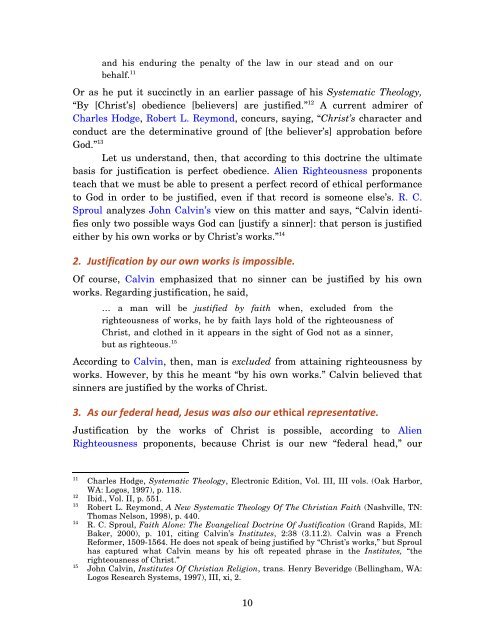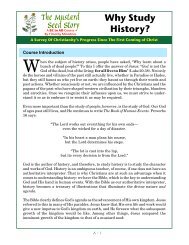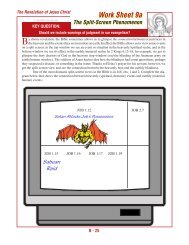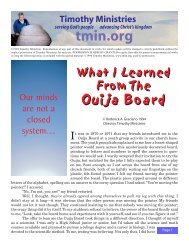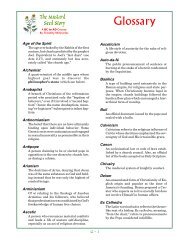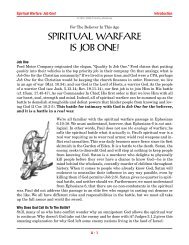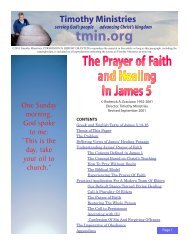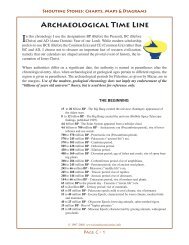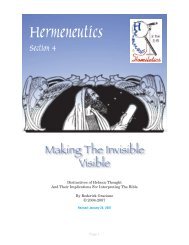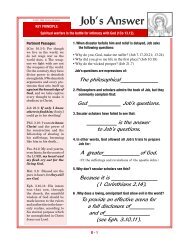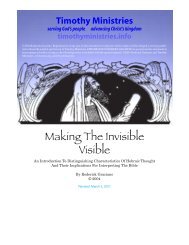Alien Righteousness? - Timothy Ministries
Alien Righteousness? - Timothy Ministries
Alien Righteousness? - Timothy Ministries
Create successful ePaper yourself
Turn your PDF publications into a flip-book with our unique Google optimized e-Paper software.
and his enduring the penalty of the law in our stead and on our<br />
behalf. 11<br />
Or as he put it succinctly in an earlier passage of his Systematic Theology,<br />
“By [Christ’s] obedience [believers] are justified.” 12 A current admirer of<br />
Charles Hodge, Robert L. Reymond, concurs, saying, “Christ’s character and<br />
conduct are the determinative ground of [the believer’s] approbation before<br />
God.” 13 Let us understand, then, that according to this doctrine the ultimate<br />
basis for justification is perfect obedience. <strong>Alien</strong> <strong>Righteousness</strong> proponents<br />
teach that we must be able to present a perfect record of ethical performance<br />
to God in order to be justified, even if that record is someone else’s. R. C.<br />
Sproul analyzes John Calvin’s view on this matter and says, “Calvin identifies<br />
only two possible ways God can [justify a sinner]: that person is justified<br />
either by his own works or by Christ’s works.” 14<br />
2. Justification by our own works is impossible. <br />
Of course, Calvin emphasized that no sinner can be justified by his own<br />
works. Regarding justification, he said,<br />
… a man will be justified by faith when, excluded from the<br />
righteousness of works, he by faith lays hold of the righteousness of<br />
Christ, and clothed in it appears in the sight of God not as a sinner,<br />
but as righteous. 15<br />
According to Calvin, then, man is excluded from attaining righteousness by<br />
works. However, by this he meant “by his own works.” Calvin believed that<br />
sinners are justified by the works of Christ.<br />
3. As our federal head, Jesus was also our ethical representative. <br />
Justification by the works of Christ is possible, according to <strong>Alien</strong><br />
<strong>Righteousness</strong> proponents, because Christ is our new “federal head,” our<br />
11<br />
12<br />
13<br />
14<br />
15<br />
Charles Hodge, Systematic Theology, Electronic Edition, Vol. III, III vols. (Oak Harbor,<br />
WA: Logos, 1997), p. 118.<br />
Ibid., Vol. II, p. 551.<br />
Robert L. Reymond, A New Systematic Theology Of The Christian Faith (Nashville, TN:<br />
Thomas Nelson, 1998), p. 440.<br />
R. C. Sproul, Faith Alone: The Evangelical Doctrine Of Justification (Grand Rapids, MI:<br />
Baker, 2000), p. 101, citing Calvin’s Institutes, 2:38 (3.11.2). Calvin was a French<br />
Reformer, 1509-1564. He does not speak of being justified by “Christ’s works,” but Sproul<br />
has captured what Calvin means by his oft repeated phrase in the Institutes, “the<br />
righteousness of Christ.”<br />
John Calvin, Institutes Of Christian Religion, trans. Henry Beveridge (Bellingham, WA:<br />
Logos Research Systems, 1997), III, xi, 2.<br />
10


